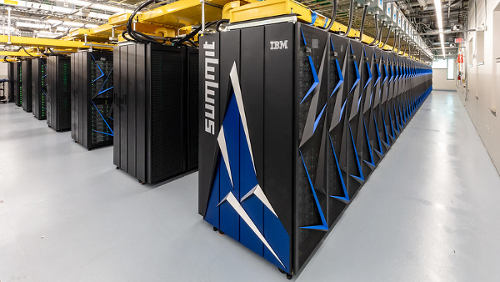Atoms are big
Simon Burton. November 19, 2019.
We are at the dawn of the age of quantum computers. But I've had enough of people saying that quantum computers are just like ordinary computers, only faster. There is some truth in that statement but it misses the real significance of the quantum.
Google has recently announced a quantum computer that can do a calculation in 2 minutes that would take an ordinary computer 10,000 years. Making this comparison sounds impressive, and it is a good way to sell quantum computers. But it misses the point. Do we really need faster computers anyway?
Let me try to explain what it looks like as we use more and more qubits. I'm not going to explain what a qubit is. Instead, this is about how qubits combine: a qubit and a qubit and and a qubit and ... etc. etc. The key here is the "and", or rather, quantum "and".
Given pen and paper, I can do some calculations (on a good day) that model 4 qubits:
More than that and I reach for my laptop. I've managed to crash my laptop so many times because of simulating qubits, but if I'm careful I can simulate up to about 30 qubits:
Beyond this we need some big iron. The Summit supercomputer covers an area of about two basketball courts and uses 10 megawatts of power.
 |
| Image credit: OLCF at ORNL |
Using this machine it would be possible to simulate about 50 qubits:
This is close to the Google quantum computer: the Sycamore processor has 54 qubits.
If we covered the entire planet Earth with Summit supercomputers, we could fit about one trillion () of these. Then we could simulate around 90 qubits:
We would also need about 10 billion nuclear reactors to power these supercomputers!
If we completely surround the sun with a giant sphere, called a Dyson sphere, we could use the resulting solar energy to power Summit's. Assuming the calculation would finish before the sun burnt out in 5 billion years, this gets us to 110 qubits:
If we surround every star in the entire universe with Dyson spheres powering supercomputers we could simulate 140 qubits:
This completely disregards the time it would take to run such a computation. Every part of this multi-star supercomputer needs to communicate with every other part, and the speed of light puts severe restrictions on how long this would take. But why stop there? Suppose we somehow managed to explode every particle in the universe into pure energy. The physicist Seth Lloyd has calculated the absolute maximum amount of information that could be stored using all the matter of the entire universe. Assuming this maximum capability we could simulate about 400 qubits:
People are even talking about building quantum computers with many more qubits than this.
“We have a plan to get to 1,000,000 qubits. In one dil fridge. But I’m not telling you how big the dil fridge is.” pic.twitter.com/zggqLeyc9d
— John Preskill (@preskill) November 1, 2019
So tell me again about how quantum computers are just like ordinary computers only faster? This just doesn't make much sense.
The real significance of quantum computing is that it is a complete change of perspective. The ordinary universe, that we see when we look up into the night sky, is merely the thinnest crust on an unknowably huge quantum realm. We have had the theory of quantum physics for nearly a hundred years telling us that this is so. Now we also have the Google experiments that show this quantum world is real, and we have access to it.
The quantum world is vastly bigger than the ordinary (classical) universe, but where is this world? Out there, or up above, or within? I don't know what words to use. There is nothing spatial about quantum. The "and" of quantum sees no separation between the pieces.
These might sound like the statements of a new-age guru, but I'm actually doing my best to channel the mathematical foundations of quantum physics. None of this is meant to be controversial to the practicing physicist, although maybe it is to many. I clearly remember my undergraduate physics lecturer stepping away from the blackboard after a vigorous calculation involving quantum amplitudes. He then completely disavowed the implications of what he just calculated, as if to reassure the students of his sanity. This seems to be a widely held viewpoint: "the calculations are one thing, but we don't really believe this algebra, can someone fix it please?"
Just about any reference on quantum physics will say something about how the quantum realm is about the physics of really small things: atoms, photons, and things like that. Those things "down there":

This change in perspective, as demonstrated by quantum computers, shows that we have this entirely wrong. We are the small thing "down there" and the atoms, the quantum realm is the big thing. I like to summarize this perspective by the seemingly ridiculous slogan: atoms are big!

Forget about going to mars. Forget about billion dollar particle accelerators. Forget about the next iPhone. Quantum computing is the only game in town.
References
Seth Lloyd's paper "Ultimate physical limits to computation" from 1999.
Copyright (c) 2018 - 2019.